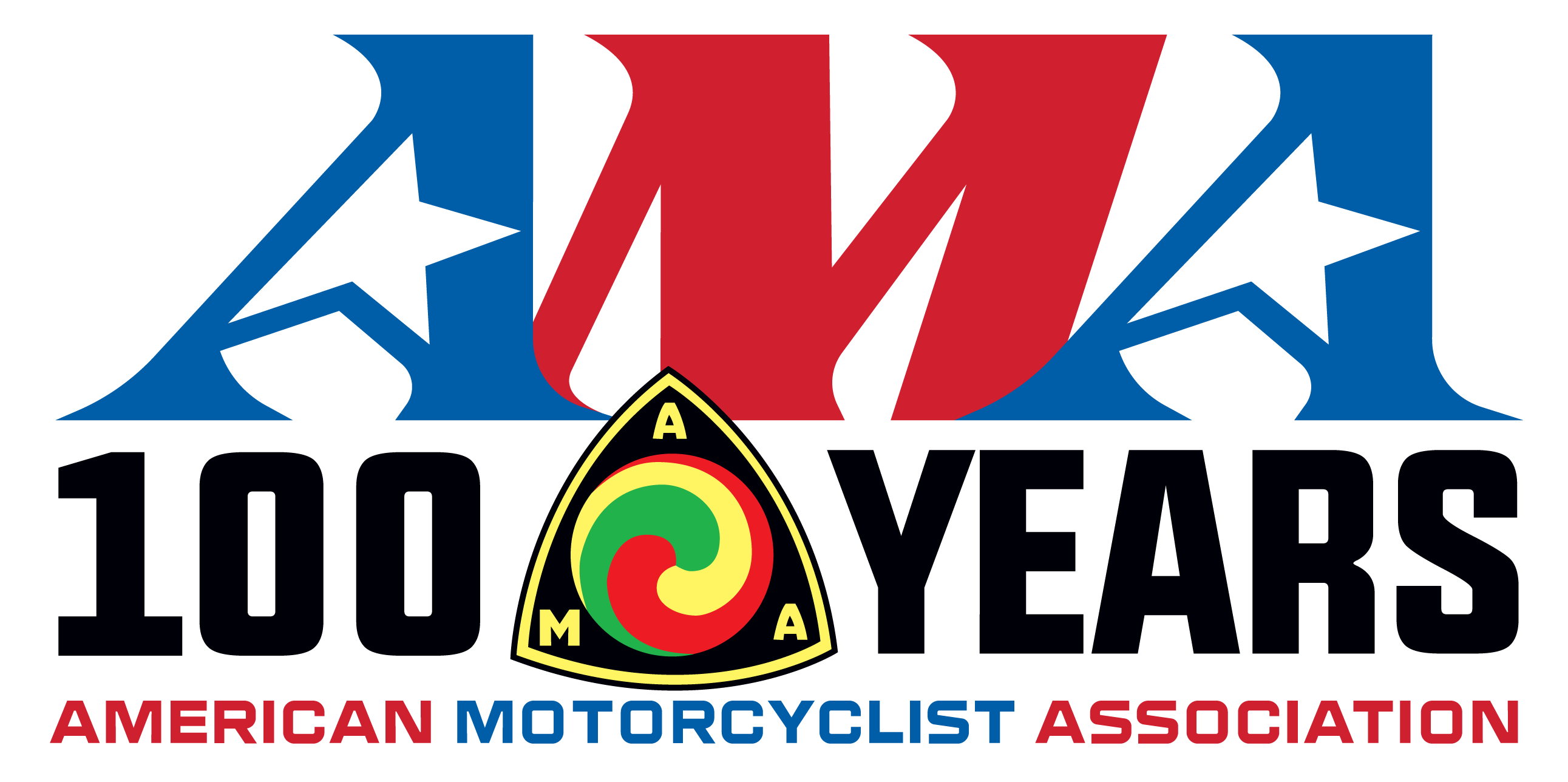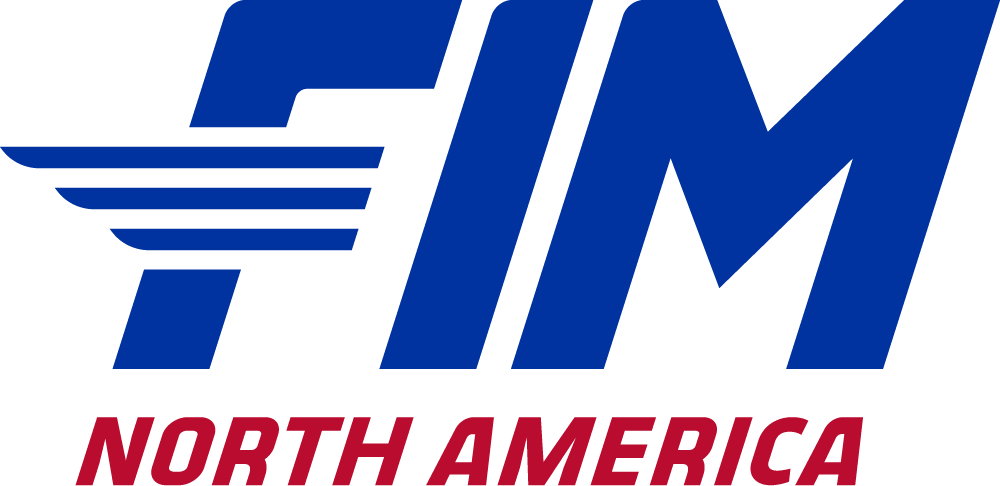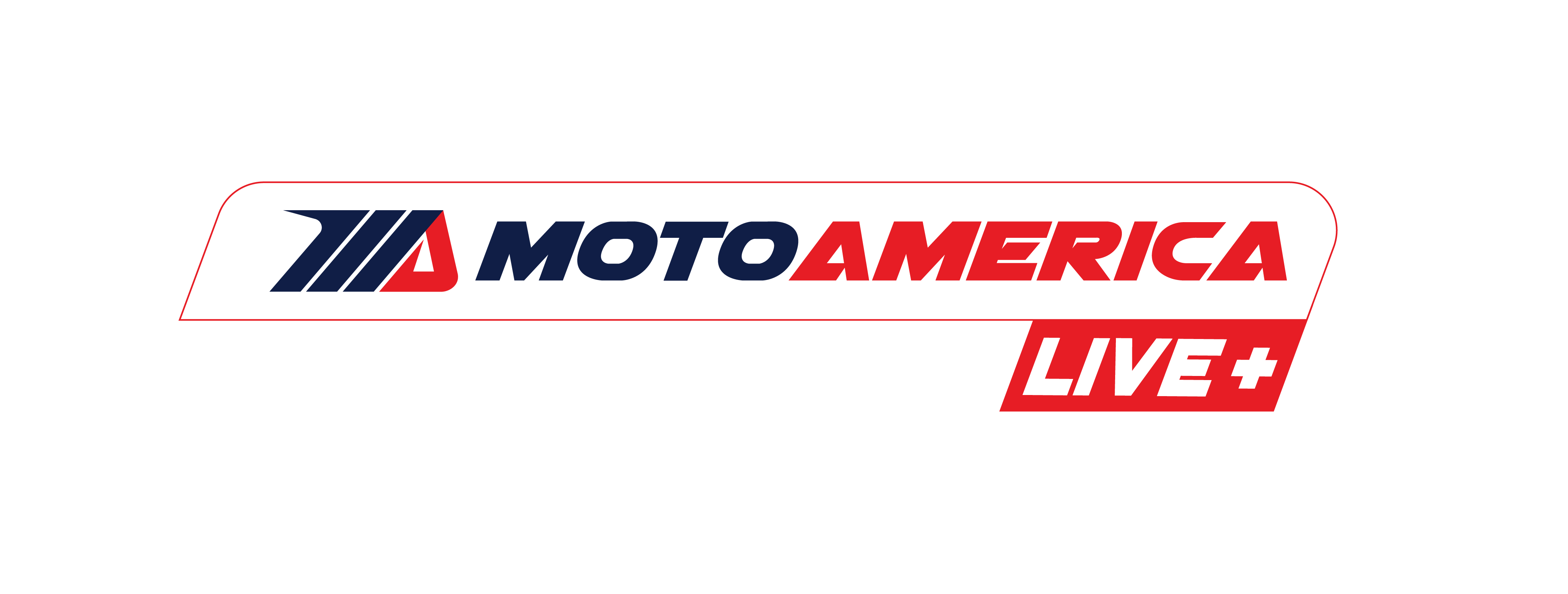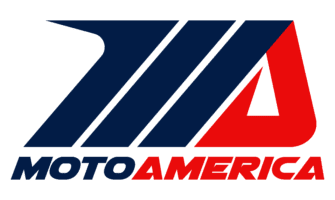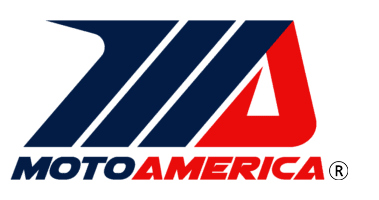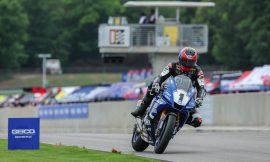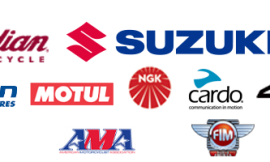Fred Merkel is the fifth of 21 AMA Superbike Champions and is the focus of this week’s “21 in ’21” series, which highlights a new AMA Superbike Champion each week as we move through the 2021 MotoAmerica season – the 45th year of the premier class championship.
To a man, each of the AMA Superbike Champions featured in the first four of our 21 in ’21 series of interviews has talked about what unwieldly beasts the early Superbikes were to ride. Fred Merkel was fortunate enough to be on the tail end of that. Fortunate in that he got the chance to experience what they were like to ride, even more fortunate to be in the prime of his career when Superbikes became lighter, smaller, better-handling motorcycles.
With long blond hair and blue eyes, Merkel looked more California surfer boy than motorcycle racer. But the boy could race. After all, you don’t win three AMA Superbike Championships and two World Superbike Championships sitting on the beach. Merkel was also the first rider to record double-digit wins in an AMA Superbike season when he won 10 in his first championship year of 1984.

“It was a blast,” Merkel says of the early years of AMA Superbike racing. “Superbikes, the conception of that was in the ‘70s. The likes of Steve McLaughlin and stuff like that. Of course, as you know, back then they were the animal bikes. They were 1025cc big, bad mama jamas that made a lot of noise and went really, really fast. They were pretty heavy back then, but they were definitely state of the art for its time and era. I was fortunate enough to actually kind of cut my teeth before the Honda days with Yoshimura on the 1025 Katana that Wes Cooley rode, and I got to experience those big animals. Eddie (Lawson) and Wayne (Rainey) and all those guys rode those things. Then I got to go to the Honda tryout to Laguna Seca and ride actually Freddie’s (Spencer) 1025 and compare the Katana to that.

“I was 17, I think. I was scared to death. I’m never going to be able to ride these things. But it was good to be able to get in towards the latter part of the 1025, which it was. In ’83, it was the first year of the 750 Interceptor. So, things changed a lot. The weight rule dropped a bit and, of course, the horsepower came down a bit, but the bikes were far more, I wouldn’t say superior, but maybe user-friendly on the racetrack. As things go on, technology gets better and stuff like that. It was really good. To get on the ground running with Honda in ’83 as first their support rider and then a factory guy on a factory bike a few months later because Steve Wise got hurt. I was lucky enough to fill that position. The bikes just progressed and progressed. It was really cool to actually be at the latter end of the 1025 and get on the 750. The rest is basically history.”
Merkel credits the fact that he was able partake in the U.S.A vs. Brits Match Races in 1986 as one of the things that helped propel his career.
“The lucky thing for me, and probably for Kevin Schwantz as well, was that getting into the AMA stuff when it got to the 750s, and then I was lucky enough in ’86 to go to the Match Races in England and I was the team captain for the Americans, Team America,” Merkel said. “We got to experience racing in Europe basically for the first time. I had raced in Japan before with Suzuka and stuff like that, but to experience it over there… That just gave us so much exposure. So that was a foothold for myself and for Kevin. It definitely made his career go leaps and bounds. That was kind of the first taste of what was to come. But we still had a long way to go for that season ’86. The ’83, ’84, ’85, ’86 seasons were magical years with Team Honda, with Merlyn Plumlee, Mike Velasco, Todd Schuster, all of the people that you know. To be able to have a chance to be a part of their effort, their team, and the series. Even the days back when I got my tryout, basically I rode my first race with Yoshimura in ’82, ’83 with Don Sakakura and Mr. Itoh. Just fabulous people. Just lucky to be a part of that era. I’m grateful.”

With Lawson, Rainey, Spencer and Schwantz all earning 500cc World Championships, Merkel’s route was a bit different. But he also came home with world titles, albeit in the upstart World Superbike Championship.
“That was just again right place, right time,” Merkel explained. “Things were really starting to take off as far as Superbike goes globally. Every country had their Superbike series, with Steve McLaughlin kicking off the inaugural World Superbike Series in 1988. Everybody that was involved in Superbikes globally in their country knew that that series was going to take off. Everybody kind of spent the ’87 season, like me, doing as many races as possible getting geared up for that. After my years with Honda, I was lucky enough to get a chance with Honda Italy and HRC Japan because I had a very good rapport with HRC Japan and Mr. Ika. He had the faith in me to take the RC30 the first year, that weapon, and take it to Europe and do the business. So, very fortunate.
“The timing couldn’t have been more impeccable getting geared up in ’87 to go to Europe the following year. I was just riding as many races as I could in England and Italy. I did Assen and then a few more. It was a good taste. Of course, the world series then, we did a full world series. Lots of countries, lots of racetracks; Hungary, Czechoslovakia, Portugal. That was an experience. All the races in Spain. Basically, every racetrack in Italy. That was huge. That was a massive undertaking just to go, ‘we’re the first cats to do this,’ and do the whole global thing, especially with the Superbike in the first year of the RC30. It was an experience. It was a dream come true.”

The Honda RC30 would end up being an iconic motorcycle and the rider most think of when they think RC30 is Fred Merkel.
“It was amazing because it was an absolutely amazing motorcycle,” Merkel says of the RC30. “It was nimble. It was a bullet. It’s funny, if I look a 1988 RC30 now, a streetbike, you go, ‘Man, that’s old.’ I remember the first time I got on it, that was in Brands Hatch. That was the weekend before the very first World Superbike race in Donington in 1988. I think it was the weekend before. The bike showed up when we went to Brands Hatch and I think there was a British Superbike race there. I remember the first time I got on it, just leaving the pits, the paddock going down the racetrack, I almost flipped it in the pits in first gear. I was like, ‘holy crap.’ Just wasn’t ready for it. Of course, Brands Hatch is just a real low-gear racetrack. First gear you’ve got a sprocket on the back that big. I remember grabbing a handful of this thing just not ready, with one hand on the handlebar, and it came straight in the air. I’m thinking, this is a good look with every HRC member from Japan standing on the wall here watching this idiot going to flip their brand-new motorcycle before he even gets on the racetrack. It’s like, here’s our future World Champion. Yeah, right.
“(It was) just an absolute weapon. Instantly. It only took 10 minutes for me to come to grips with it. It was so easy to ride, so user-friendly. The power delivery was so smooth, but it had a big punch. It didn’t have a heap of top end, but it got you there really, really quick. What was really funny is that coming from AMA stuff where back in the days where we used to use handlebars, the real low-cut handlebars. The bike actually came with clip-ons. It was set up for some little Japanese test pilot I guess that had these handlebars, these clip-ons. They were almost at a 45-degree angle. I got on the bike and I looked at my mechanic… then it was Norris Farrow and Chris Johnson. I went, I can’t ride this thing. I can’t even hang onto it. So, we ended up taking the clip-ons and we turned them upside-down. So, I rode like that.”
Merkel was not only associated with the Honda RC30, but he was also the face of the World Superbike Championship. That’s what happens when you win the inaugural season and then follow it up with another title the next year.
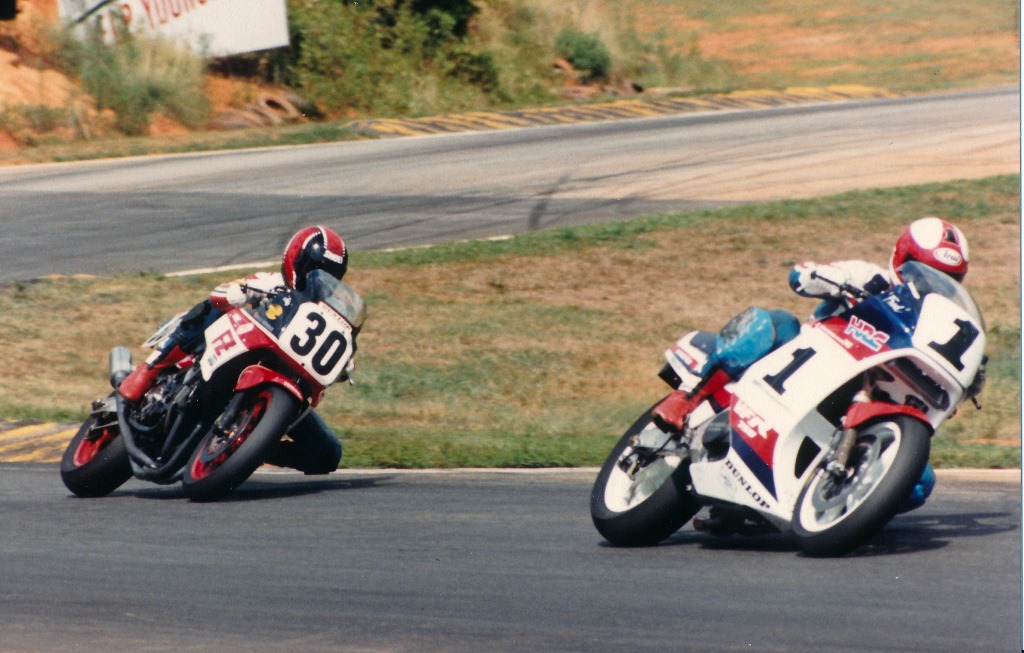
“Two great years,” Merkel says of those championship-winning seasons. “They were all great years. Back then, the weight rule was basically the same from the twin-cylinder to the four-cylinder with the Ducati and stuff. The Honda was an absolute bullet. I think once the series kicked off in such a strong way the first year in 1988, then all the manufacturers really went, ‘Okay, we can’t just let Honda dominate with this RC30.’ I think everybody took a keen interest in that series after that because they saw in the future how popular it could be, and the manufacturers could definitely sell their wares. New prototypes, new motorcycles and stuff like that. What I’m trying to say is that the Honda was a weapon the first year, and then everybody caught on the second year and really improved from there, especially Ducati when they went from the blades, the 926 and stuff like that. Of course, they had a different weight rule. That really made things tough for us. So, it was something to experience all that. Everybody just got on the bandwagon and just went from there. So, it went from strength to strength, basically.”
After his years in Europe, Merkel ventured back to AMA Superbike racing, but not with Honda.
“We left Europe in 1993,” Merkel said. “1994 was my first year back with Rob Muzzy Kawasaki. That was it. We had a fun year with the Kawasaki… kind of hit-and-miss. Went on to Suzuki and we had great times with Don Sakakura, Mr. Itoh. Won a whole bunch of Supersport races and did fairly decent. Not really, but did okay on a Superbike. We always knew that bike was pretty old by then. I got hurt in ’95 and that was it. I got hurt so bad that I wasn’t able to train and really catch my training window and fulfill my contract. Plus, the process that I had pretty much in my left arm and shoulder, it took me a few years to actually get back. So, it was done. The days were numbered. We had achieved a lot with a lot of teams and a lot of wonderful people that helped along the way. They’re too numerous to name. Real lucky. Very fortunate. I’m a real lucky guy.”
After retiring from the sport, Merkel packed up and moved to New Zealand where he raised a family. Although Flyin’ Fred had hung up his leathers, he returned to the sport when his oldest son started racing.
“A wee bit with my son Travis racing,” Merkel said of his return to the racetracks. “Travis turned 30 a couple weeks ago. I have Jhett, my little one. He’s 11. Travis started racing more than a decade ago and raced for basically five years. So that kind of rekindled me back into the motorcycling circle again. Travis won a few championships in New Zealand racing. So, we did really good. Then with the help of Phil and Cheryl London in New Zealand, Travis got to go and experience a year of racing in Italy. We had a great time. He did great. That’s about the only involvement that I had. That got me back into racing, which was a lot of fun. It scared me to death, but he lived through it. That was about it. I follow it. I watch it. I watch you cats. I just enjoy it.”
Now Merkel is back in California, constructing buildings as a welder.
“I’m a filthy welder,” Merkel said. “Structural steel, buildings, whatever. Still on the tools. Still doing it hard. The body doesn’t like it. The body is definitely well beat up. Still doing young man’s work. I’m in the Bay area now with my girlfriend, Guinevere. Just doing other things. Especially into my archery. It’s basically my new archery – it’s not new. I did it with my dad in the ‘80s, but I haven’t shot a bow in 30 years up until about four and a half months ago. I never thought there was going to be anything that would replace personally two wheels for me and the same drive and motivation. As you know, it’s a very disciplined sport. It’s very difficult. You can hit the bullseye a few times and then try to hit it every time. It’s very difficult. It takes a lot of discipline. It’s so challenging. It’s definitely given me that high like I got from racing.”
Going way, way back, Merkel recalls the early days of riding motorcycles.
“It was my mom and dad the reason why I achieved what I achieved,” Merkel said. “Dad was a racer and stuff like that. In the late ‘60s, early ‘70s things were getting hot and heavy with the younger kids, the children of the adults then racing. They started a minibike series in Northern California. It was across America as well back then. Very competitive. I guess that’s where I got it from, my mother and father. The racing was just something that I just had to do. It was all I ever wanted to do. Ever since going to the San Jose Mile for the first time, I think in 1970, and hearing those bikes and everything else. It was like, ‘this is going to be me.’ This is what I’m going to do. As you know, when you get better at something you just want to do more and more and more. You get better and better and better.”
Once he got started riding, it progressed rapidly from there and his history even includes riding with MotoAmerica COO Chuck Aksland.

“Amazingly enough, my dad was a gas welder and on the weekends, he would moonlight and do trailer parks and do the underground gas and stuff,” Merkel said. So, when he would go and do these on the weekends, he would let me take my Yamaha 60 Mini Enduro with him. So, I would go and help him roll pipe while he welded and after I did a few hours of that, he let me go off and ride my motorcycle. One we were working at was in Manteca. Lo and behold, this trailer court is next to guess who? Bud Aksland’s workshop, where Skip Aksland and Chuck Aksland lived. I remember looking across the field going, ‘they’ve got a big track over there’ And look, there’s this little kid. He’s riding a bike just like mine. So, this went on for the afternoon and the next day we went back there and I’m looking at it. My dad says, ‘all right, let’s go over there.’ So, we loaded the bike and went over there and we met Bud Aksland, Skip Aksland, and little Chucky. So, on the weekends that my dad would go back there and work I would go with him, of course, and I would spend the day hanging out with Chucky. We would just ride on the tracks that Bud had built. Kenny Roberts was there. That was the whole beginning of Kenny Roberts and all that stuff, right in that place in Manteca at Bud Aksland’s place. I would ride there as much as possible. Me and Chuck were mixing. We would just ride and ride and ride. We would use every drop of gas on the property. We would break as many frames as we could break and then we’d just stop and walk across the field to the little store and buy powdered donuts.”
Merkel’s motorcycling adventure has been a good one and the man is grateful for all of it.
“I’ve been fortunate enough to ride bikes, do all types of motorcycling and take our craft worldwide,” Merkel said. “So, I’ve been very fortunate and very, very lucky.”
